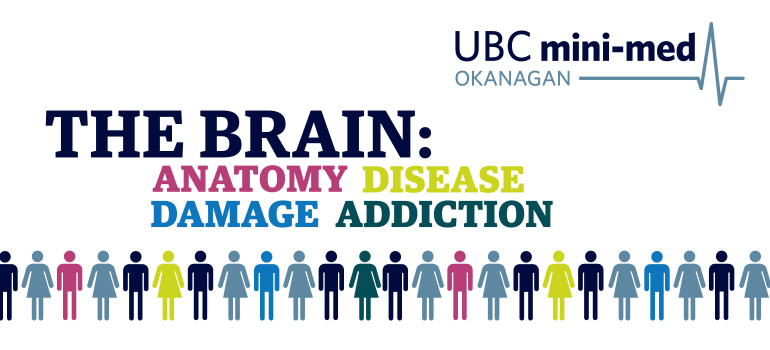
The human being’s most critical organ, the brain, is the topic of this year’s Mini-Med series.
Each year, UBC professors bring their knowledge out of the classroom and into the community for a four-week health-based lecture series. Starting October 25, the UBC Clinical Academic Campus, located at Kelowna General Hospital, is the site for the educational medical lectures.
“Mini-Med is another way Okanagan communities are sharing in the expertise at UBC,” says Deborah Buszard, Deputy Vice-Chancellor and Principal. “This lecture series offers an extraordinary opportunity to learn about advances in health and medicine from leading researchers. As Mini-Med students, participants will get to know the brain and learn about pioneering discoveries which are improving diagnosis, treatment and care.”
Mini-Med 2016 curriculum: The Brain
October 25—Brain Basics: Facts, functions and anatomy Assoc. Prof. Bruce Mathieson,
Assoc. Prof. Bruce Mathieson, microbiologist and neuroscientist, will give a brief introduction on the brain and use an interactive tool he developed for his teaching program at UBC Okanagan. He will also discuss his own research program involving a new group of hormones—neurosteriods—thought to have potential implications for neurodegenerative disease.
November 1—Brain Afflictions: Why diseases like Alzheimer’s and Parkinson’s take hold Prof. Philip Barker, molecular
Prof. Philip Barker, molecular biologist and biochemist, will discuss his basic science research program at UBC Okanagan involving Alzheimer’s and Parkinson’s disease. Co-presenting with Barker is Dr. Daryl Wile MD, the newest neurologist to join the Parkinson’s community in Kelowna. The pair teams up for this bench to bedside lecture that looks at the earliest pre-clinical events in the brain and how they may eventually present clinically in diseases like Alzheimer’s and Parkinson’s.
November 8—Understanding Stroke and Recovery
Dr. Harry Miller is a clinical neuropsychologist, clinical assistant professor of psychology and clinical instructor in the UBC department of psychiatry. Dr. Miller, who specializes in stroke recovery, will discuss his research into neglect; a very real after-effect of stroke that creates a perception of vision loss and at the same time severely hinders recovery. He’s joined by Jennifer Upshaw, a PhD student in UBC’s Clinical Psychology program, who will talk about hemi spatial neglect in stroke patients.
November 15—Addictions as a Brain Disease
Dr. Leslie Lappalainen, an addictions medicine specialist, will talk about how drug abuse and alcohol affect the brain and the science that underpins addiction. She’ll offer up some of the latest research for different treatments for alcohol and opioid addiction, and discuss reasons why they are currently underutilized. Dr. Lappalainen is the medical lead for Addiction Medicine, Mental Health and Substance Use at Interior Health, and a clinical instructor with the UBC Faculty of Medicine.
Registration is required and people can sign up for one session ($10) or all four. For the entire series, the fee is: adults $30; second adult $20; seniors (65+) $20; students: $15. Space is limited, so early registration is suggested: minimed.ok.ubc.ca
—30—